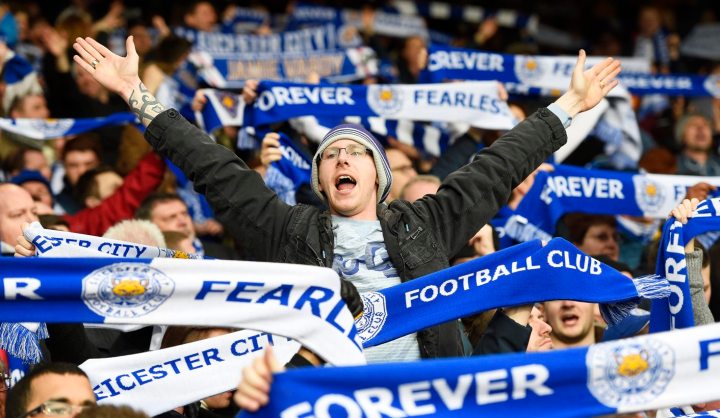Sport
Leicester City: The Premier League’s Cinderellas with a sugar daddy

Leicester City could achieve the most remarkable thing in England’s top division since Brian Clough led Nottingham Forest to the title in 1978. Their story and the way they have played this season certainly is remarkable, but it’s difficult to think that they could have done this without the financial crutch of their billionaire owner. By ANTOINETTE MULLER.
When foreign investment into the Premier League is mentioned, what do you think of first? Do you think of the stadium of a north London club built by an airline from the United Arab Emirates? Do you think about the London club with a very wealthy Russian owner? Maybe, though, think about the blue team from Manchester or, perhaps, the slightly wacky Vincent Tan, owner of Cardiff City.
Chances are, when foreign investment in the Premier League is mentioned, you probably don’t think about the current Premier League’s darlings, Leicester City. The Foxes are on the brink of achieving the most remarkable thing in England’s top division since Brian Clough led Nottingham Forest to the title in 1978, just a year after being promoted to top flight football. Leicester City currently sit at the top of the table on 69 points, seven points ahead of second-placed Tottenham. Six matches remain for the Foxes to pull off the ultimate Cinderella story and, if you are a neutral, there is no doubt that you are cheering them on.
This looming triumph is made more remarkable by the fact that last year this time, they were battling relegation and fighting for survival in the very league they are now about to win. But is their story really so different to the other clubs accused of “buying” their success? Well, yes and no.
In 2014, when the club won promotion, billionaire Thai businessman Vichai Srivaddhanaprabha, who bought the club in 2011, didn’t shy away from the fact that he would “spend to make the top five of the English Premier League”.
“I am asking for three years, and we’ll be there. We won’t take the huge leap to challenge the league’s top five clubs immediately. Do we have a chance to beat them? Yes, we have, but I think we need to establish our foothold in the league first and then we think about our next step.”
It has taken two years and a little less money than he might have anticipated, but even before the Foxes had won promotion, Srivaddhanaprabha had already been pumping money into the club. His consortium purchased the club in 2010 and in 2011 he was named as the club’s chairman. Within one season he had flexed his financial muscle, absorbing £103-million of the club’s debts, making it effectively debt-free for the first time in two decades.
Back then, no other club in the second division was losing that much. The club’s wage bill was siphoning cash, the third highest in the division with very little to show for it at the time. Leicester finished sixth in the 2012-13 season, but eventually won promotion in 2013-14. It wasn’t until that promotion that the club would turn a profit, thanks to the Premier League’s television deal giving them a boost.
After surviving their relegation scare, the club had to make sure it did not happen again and their chairman kept true to his word: he would spend to make the top five. And spend the Foxes did. Their net transfer spend totalled £30.53-million, the sixth highest of all Premier League clubs.
Sure, they have made some wise recruitment choices (something other billionaire-owned clubs can’t really boast), but the cruel truth is that they probably would not have been in this position had they not had the luxury of foreign investment. Such is the reality and, perhaps, tragedy of modern-day football in the Premier League: a large chunk of investment will prop you up through the rough times.
But even though Leicester City have been propped up financially, perhaps their greatest achievement of all is that they have achieved their dramatic success through a group of relatively unremarkable players. That is not to insult the players, it simply means that unlike, say, Manchester City, who have seemingly snapped up every unhappy player from their rivals, Leicester have not achieved their success by buying well-known established players.
Even the arrival of manager Claudio Ranieri in 2015 raised more than a few eyebrows. He had been sacked as manager of the Greek national team after they lost a Uefa qualifier to the Faroe Islands. Many considered him to be in managerial decline and while he would have had fond memories of his days at Chelsea – where he started building of the side that would win two titles under his successor José Mourinho – the scepticism was warranted.
Somehow, it seems Ranieri revived that tactical nous that saw him break Chelsea’s club records for the fewest goals conceded and highest number of points in a season, all while he had spent time nurturing the talents of John Terry, William Gallas, Wayne Bridge, Claude Makélélé and Frank Lampard, all players who would go on to achieve great success under Mourinho.
Under pressure to clinch that illustrious title, Leicester City have won their past six games 1-0, a scoreline that became synonymous with Arsenal in their heyday. But while winning 1-0 does not guarantee title success, it does speak volumes of a team being able to hold their nerve and stick to their tactics. They have lost just three matches this season (drawing nine and winning 20 to date) with only Spurs and Manchester City having scored more goals than them. Leicester City also have some of the worst possession in the league with 43.8 percent. Only one other club in the top 10 (West Ham with 46.3 percent) has possession stats of under 50 percent, and therein lies the rub.
That 1-0 score line – the ability to defend well, especially once they have countered quickly – is what has set them apart from other teams this season and that is something that no amount of money can buy. DM
Photo: Leicester City fans cheer for their team during the English Premier League soccer match between Crystal Palace and Leicester City at Sellhurst Park in London, Britain, 19 March 2016. Leicester won 1-0. EPA/FACUNDO ARRIZABALAGA



















 Become an Insider
Become an Insider